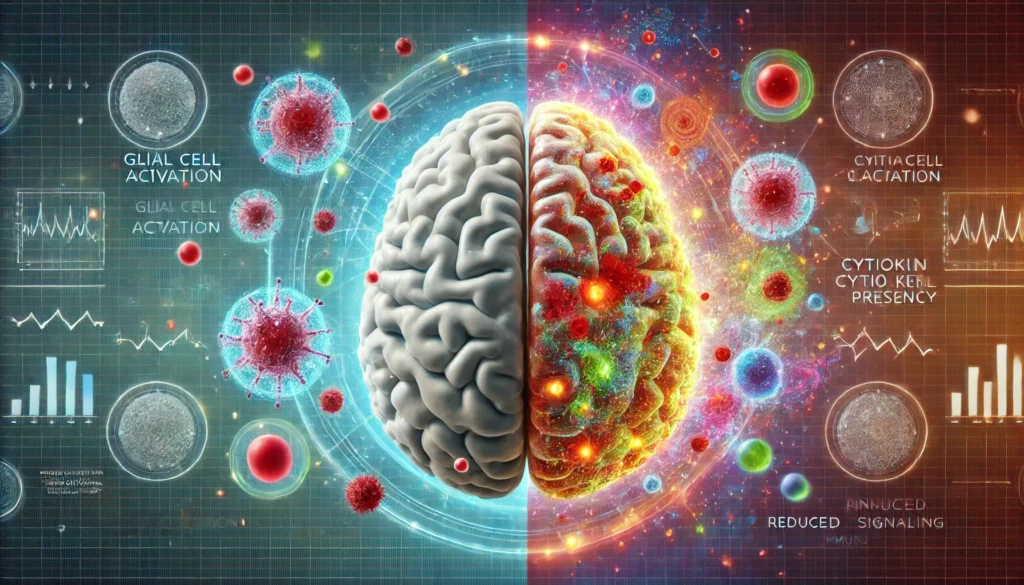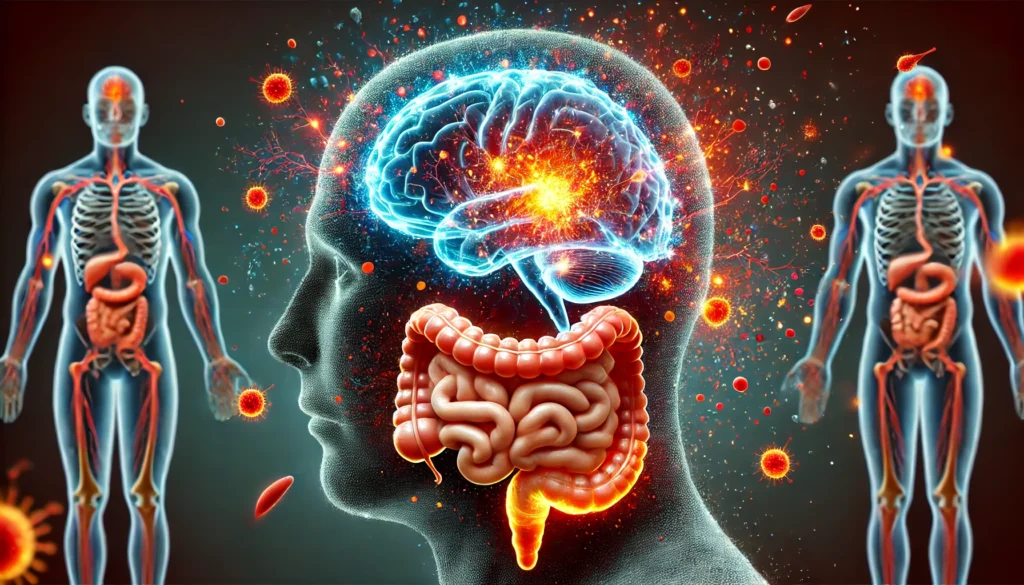Introduction
The human brain, a marvel of intricate neural pathways and biochemical communication, is deeply connected to the immune system. When functioning optimally, this relationship helps protect against infections, support healing, and ensure mental clarity. But in people with autoimmune conditions, that balance can be profoundly disrupted. One of the most frustrating and under-recognized symptoms that arises from this disruption is known as autoimmune disease brain fog—a debilitating condition marked by confusion, memory lapses, and slowed thinking. For many, this symptom becomes as life-altering as the physical manifestations of autoimmune illness itself.
You may also like: Do Carbs Cause Brain Fog? What Science Reveals About Carbohydrates and Mental Clarity
Unlike the transient mental fatigue experienced during stress or lack of sleep, autoimmune brain fog often appears suddenly, unpredictably, and can linger for days, weeks, or even months. Individuals may feel as though their mind is trapped in a haze, incapable of holding onto thoughts, processing information, or completing even the simplest tasks. Despite outwardly appearing normal, sufferers often feel as though they’re mentally disconnected—trapped in a state of cognitive sluggishness that no amount of caffeine or rest can fix.
What makes this brain fog so complex is that it’s not a standalone condition. Rather, it’s a symptom that emerges from the ongoing immune dysfunction characteristic of autoimmune diseases such as lupus, multiple sclerosis (MS), rheumatoid arthritis (RA), celiac disease, Sjögren’s syndrome, and Hashimoto’s thyroiditis. In these conditions, the body’s immune system mistakenly attacks its own healthy tissues, including—critically—the brain and central nervous system. Over time, chronic inflammation becomes the biggest cause of inflammation brain fog, affecting neurotransmitter balance, disrupting blood flow to the brain, and impairing communication between neurons.
This article offers a deep exploration of autoimmune-related brain fog, tracing its immunological roots, identifying contributing factors, detailing the diagnostic challenges, and presenting integrative, science-backed treatment strategies. By better understanding how autoimmune disease brain fog works, patients and practitioners can take meaningful steps to restore clarity, cognitive function, and quality of life.

How Autoimmune Diseases Trigger Brain Fog
Autoimmune diseases are defined by an immune system gone rogue. Instead of protecting the body from foreign invaders, the immune system turns inward, targeting organs, glands, tissues, and, in some cases, the central nervous system. When this happens, brain function can be directly or indirectly affected, leading to a cluster of neurological symptoms collectively referred to as autoimmune brain fog.
In diseases like systemic lupus erythematosus (SLE), antibodies can cross the blood-brain barrier and attack brain tissue, causing neuroinflammation. In multiple sclerosis, immune cells degrade the myelin sheath that insulates neurons, leading to impaired neural signaling. Even in autoimmune thyroid disease like Hashimoto’s, elevated antibodies can impact brain metabolism, leading to confusion, forgetfulness, and slowed thinking.
At the core of these symptoms lies inflammation. The immune system releases pro-inflammatory cytokines—chemical messengers such as interleukin-6 (IL-6), tumor necrosis factor-alpha (TNF-α), and interferons—that cause widespread immune activation. These cytokines are essential in fighting infections but, when chronically elevated, they become toxic to brain cells. They interfere with the production of neurotransmitters like serotonin and dopamine, disrupt glucose metabolism in the brain, and impair synaptic plasticity—ultimately impairing cognition, attention, and memory.
For many patients, the immune system’s attack doesn’t need to directly target the brain. Peripheral inflammation alone can spark neuroimmune responses that result in mental fog. This is particularly evident in rheumatoid arthritis and inflammatory bowel diseases, where systemic inflammation correlates strongly with cognitive dysfunction, even in the absence of overt brain lesions.
The Biggest Cause of Inflammation Brain Fog
While autoimmune diseases themselves are inherently inflammatory, it’s important to recognize the additional factors that intensify this neuroinflammatory state and contribute to cognitive impairment. Chief among these is gut permeability, often referred to as “leaky gut.” This condition allows toxins, microbes, and undigested food particles to enter the bloodstream, triggering systemic immune responses that spill over into the brain. In fact, studies have linked intestinal permeability with increased blood-brain barrier dysfunction and glial cell activation—two hallmarks of neuroinflammation and cognitive decline.
Another potent contributor is chronic stress, which activates the hypothalamic-pituitary-adrenal (HPA) axis and increases circulating cortisol levels. Although cortisol is anti-inflammatory in acute doses, long-term stress leads to cortisol resistance, which paradoxically promotes inflammation. The end result is immune dysregulation that can worsen both autoimmune symptoms and brain fog.
Infections, too, play a pivotal role. Epstein-Barr virus, herpes simplex virus, Lyme disease, and even long COVID have all been implicated in the worsening of autoimmune symptoms, including brain fog. These infections can trigger or mimic autoimmune responses, further confusing the immune system and exacerbating cognitive dysfunction.
Poor sleep, nutrient deficiencies (especially in vitamin B12, vitamin D, magnesium, and omega-3 fatty acids), blood sugar imbalances, and sedentary behavior are additional accelerants of inflammation. Together, these factors constitute what researchers increasingly describe as the biggest cause of inflammation brain fog—a perfect storm of immune and lifestyle-related stressors that overload the brain’s resilience systems.

Symptoms of Autoimmune Brain Fog
Autoimmune brain fog doesn’t always manifest in the same way for every person. Its expression can range from mild forgetfulness to profound cognitive dysfunction that severely impairs work, social interaction, and daily tasks. However, several hallmark symptoms consistently emerge across autoimmune populations:
Mental Clarity Impairment: One of the most common complaints is the inability to think clearly. Thoughts may feel scattered, sluggish, or difficult to organize. Patients often describe it as “thinking through molasses.”
Short-Term Memory Loss: Forgetting recent conversations, appointments, or why one entered a room is a typical complaint. This short-term lapse is distressing, particularly in individuals who previously had sharp cognitive function.
Difficulty Concentrating: Tasks that require sustained attention—like reading, driving, or following a movie plot—become difficult or exhausting.
Verbal Fluency Issues: People may struggle to find the right words, mispronounce common terms, or lose track mid-sentence. This phenomenon, known as “tip-of-the-tongue” syndrome, can happen frequently.
Emotional Disconnection: Alongside cognitive symptoms, emotional flatness, irritability, or detachment are common. These changes are often mistaken for depression but may stem directly from neuroinflammatory effects.
Visual and Spatial Disorientation: Some report difficulty judging distances, navigating familiar places, or maintaining visual focus—further complicating daily activities.
Motor Coordination Slowness: In diseases like MS, the cognitive and physical overlap becomes more pronounced, resulting in delayed reaction times and clumsy motor responses.
These symptoms, while frustrating in isolation, often occur in clusters and fluctuate over time. Some individuals experience temporary relief between flare-ups, while others find the fog persists chronically without proper intervention.

Diagnosing the Source of Brain Fog in Autoimmunity
Because autoimmune disease brain fog is a subjective symptom with no single biomarker, diagnosis often requires a comprehensive and multidisciplinary approach. The first step is confirming the presence of an autoimmune condition through blood work, imaging, and clinical evaluation. Common diagnostic tests may include:
Antinuclear antibody (ANA) testing
Rheumatoid factor (RF) and anti-CCP
Thyroid peroxidase antibodies (TPOAb)
Anti-dsDNA or anti-Smith antibodies (in lupus)
MRI or brain PET scans for neurological autoimmune involvement
However, even with confirmed autoimmunity, brain fog may still go unrecognized if patients don’t articulate cognitive symptoms clearly, or if doctors attribute them to aging, depression, or unrelated psychiatric conditions. It’s essential to take detailed cognitive histories, including the timing, frequency, and severity of brain fog episodes.
Neuropsychological testing can help assess working memory, processing speed, executive function, and attention span—revealing subtle impairments that might otherwise be missed. Functional medicine practitioners often go further by evaluating for gut dysfunction, food sensitivities, heavy metal toxicity, mold exposure, and micronutrient deficiencies—all of which can amplify inflammation and impair cognition.
When viewed through the autoimmune lens, brain fog is not simply a nuisance—it is a biological signal of neuroimmune imbalance that requires tailored therapeutic strategies.

Treatments for Autoimmune Brain Fog
Treating autoimmune brain fog involves more than simply managing inflammation; it requires addressing the root cause of immune dysregulation while supporting neurological repair. Integrative treatment strategies often combine pharmaceutical, nutritional, and lifestyle-based interventions.
Corticosteroids, immunosuppressants, or biologic therapies (like TNF inhibitors or IL-6 blockers) may be prescribed to manage systemic autoimmune activity. For example, patients with lupus may receive hydroxychloroquine, while those with MS might use disease-modifying drugs like interferon beta. These can significantly reduce flares and indirectly lessen brain fog by calming systemic inflammation.
However, medication alone is rarely enough. Nutritional therapy plays a critical role in restoring brain function. Anti-inflammatory diets—rich in colorful vegetables, lean proteins, healthy fats, and low-glycemic carbohydrates—help support brain health and immune balance. Many practitioners recommend elimination diets to identify food sensitivities that may be contributing to immune activation, particularly gluten, dairy, soy, and nightshades.
Omega-3 fatty acids (especially EPA and DHA), curcumin, magnesium threonate, vitamin D, and B-complex vitamins are often used as brain-supportive supplements. Probiotics and gut-healing protocols (such as bone broth, L-glutamine, and collagen peptides) can repair intestinal permeability, reducing systemic inflammation that feeds into the brain.
Sleep optimization, daily movement, stress-reduction practices (like meditation, breathwork, and nature exposure), and digital detox are all essential tools for resetting the brain’s inflammatory threshold. Cognitive behavioral therapy (CBT), mindfulness-based stress reduction (MBSR), and neurofeedback may offer additional benefits in restoring mental clarity and emotional resilience.
Crucially, treatment must be personalized. What works for one person with autoimmune brain fog may not work for another. Success lies in identifying each individual’s triggers, barriers, and unique biology—and creating a roadmap that honors their specific path to healing.
Frequently Asked Questions
1. What is autoimmune disease brain fog?
Autoimmune disease brain fog refers to a set of cognitive symptoms that arise when the immune system attacks the body’s own tissues, leading to inflammation in the brain or disruption of its function. It is commonly experienced by individuals with autoimmune conditions such as lupus, rheumatoid arthritis, multiple sclerosis, Hashimoto’s thyroiditis, and celiac disease. Symptoms often include forgetfulness, difficulty concentrating, mental fatigue, and slowed thinking. This type of brain fog is not caused by simple tiredness but is deeply rooted in immune dysregulation and systemic inflammation that impacts neurological health. Understanding its cause is the first step toward effective treatment and recovery.
2. What is the biggest cause of inflammation brain fog?
The biggest cause of inflammation brain fog is chronic immune system activation, often stemming from autoimmune disease, gut permeability (leaky gut), chronic infections, and stress-related hormone imbalances. When the immune system is persistently triggered, it releases inflammatory cytokines that cross the blood-brain barrier and impair normal neural communication. These inflammatory messengers can alter neurotransmitter balance, disrupt glucose utilization in the brain, and interfere with synaptic plasticity—key processes involved in cognition and memory. Lifestyle factors like poor sleep, high sugar intake, and sedentary behavior can amplify this inflammatory state and worsen brain fog.
3. How does autoimmune brain fog differ from regular forgetfulness?
Autoimmune brain fog is not occasional forgetfulness due to distraction or lack of sleep. It is a chronic and often fluctuating cognitive impairment linked to immune system dysfunction. Unlike ordinary forgetfulness, autoimmune brain fog can affect working memory, decision-making, language fluency, and emotional regulation simultaneously. Patients often report being unable to think clearly, speak coherently, or follow through with tasks, even with adequate rest. This type of cognitive decline is often resistant to stimulants like caffeine and doesn’t improve significantly without addressing the underlying autoimmune or inflammatory processes.
4. Can brain fog be an early symptom of autoimmune disease?
Yes, brain fog can be one of the earliest signs of autoimmune disease, even before more classic symptoms like joint pain, rashes, or fatigue appear. For example, cognitive dysfunction is often one of the first symptoms reported in autoimmune thyroid disorders like Hashimoto’s, or neurological conditions such as multiple sclerosis. When the immune system begins attacking self-tissue, subtle neurological changes can occur that precede formal diagnosis. If persistent cognitive symptoms are present without a clear cause, it may warrant testing for autoimmune markers or other related conditions to rule out immune-related brain dysfunction.
5. What tests help diagnose autoimmune-related brain fog?
While there is no single test to diagnose brain fog, several diagnostic tools can help identify autoimmune and inflammatory contributors. These include blood tests for autoimmune antibodies (ANA, anti-TPO, RF), thyroid panels, inflammatory markers (CRP, ESR, cytokines), and nutrient levels (vitamin D, B12, magnesium). Advanced imaging like MRI or PET scans may reveal brain inflammation or lesions in cases involving the central nervous system. Neuropsychological testing can assess cognitive deficits in attention, memory, and executive function. A functional medicine practitioner may also evaluate gut health, toxin exposure, and infection history for a comprehensive view.
6. Can changes in diet help reduce autoimmune brain fog?
Absolutely. Nutrition is a cornerstone of managing autoimmune brain fog. Anti-inflammatory diets—rich in leafy greens, berries, omega-3s, healthy fats, and clean proteins—can help reduce systemic inflammation and support brain function. Eliminating common dietary triggers like gluten, dairy, soy, and sugar often improves symptoms dramatically, especially for individuals with food sensitivities or leaky gut. Gut-healing protocols that include probiotics, collagen, bone broth, and L-glutamine can also reduce brain fog by restoring intestinal integrity and reducing the immune load on the body. Consistency and personalization are key for long-term improvement.
7. How long does it take to reverse autoimmune brain fog?
The timeline for reversing autoimmune brain fog varies depending on the severity of symptoms, the underlying autoimmune disease, and the individual’s adherence to treatment. Some people notice improvement within weeks of starting an anti-inflammatory protocol, while others may need several months or more. Addressing nutrient deficiencies, improving sleep, managing stress, and reducing exposure to environmental toxins are all critical to sustained cognitive recovery. In complex cases involving neurological damage, therapy and medical treatment may be necessary to support long-term healing. Patience and personalized care are essential for success.
8. Is autoimmune brain fog permanent?
Not necessarily. While brain fog can be persistent, it is often reversible with proper care and attention to root causes. If the underlying autoimmune activity is brought under control and inflammation is reduced, many people experience significant cognitive improvement. Neuroplasticity—the brain’s ability to adapt and rewire—can support recovery when paired with anti-inflammatory nutrition, targeted supplementation, mental stimulation, and lifestyle changes. However, if brain fog is ignored or left untreated, it can worsen and potentially lead to more serious cognitive decline. Early intervention is key.
9. Does stress make autoimmune brain fog worse?
Yes, stress is a major driver of autoimmune brain fog. Chronic stress activates the HPA axis and increases cortisol, which can suppress immune regulation and increase inflammation. Over time, this stress response can cause or exacerbate brain fog by reducing blood flow to key brain areas, impairing neurotransmitter function, and promoting neural fatigue. Stress also disrupts sleep, digestion, and hormone balance—further amplifying cognitive symptoms. Stress-reduction techniques such as mindfulness, yoga, breathwork, and therapy can help rebalance the nervous system and improve brain function in individuals with autoimmune conditions.
10. Can exercise help reduce autoimmune-related brain fog?
Yes, gentle and consistent exercise has been shown to improve brain function and reduce inflammation in individuals with autoimmune conditions. Activities like walking, stretching, tai chi, and swimming help increase circulation, enhance oxygen delivery to the brain, and promote the release of endorphins and brain-derived neurotrophic factor (BDNF)—a protein essential for cognitive health. Exercise also improves sleep quality, reduces stress hormones, and supports mitochondrial energy production. The key is to avoid overexertion, as intense or prolonged physical stress can sometimes worsen autoimmune flares. A tailored exercise plan guided by a healthcare professional is ideal.

Conclusion
Autoimmune disease brain fog is more than a vague symptom—it’s a profound neurological signal that the immune system is in distress. For millions of individuals living with autoimmune conditions, the mental fog, memory lapses, and cognitive fatigue can be just as disruptive as joint pain or fatigue. Rooted in chronic inflammation, immune misfiring, and neurochemical imbalance, this fog reflects the complex interaction between the brain and the immune system—a relationship that must be addressed holistically.
By identifying the biggest causes of inflammation brain fog, from gut permeability to unresolved infections and nutrient deficiencies, patients can gain critical insight into what’s disrupting their mental clarity. More importantly, they can begin taking concrete steps—nutritional, lifestyle-based, and medical—to calm the immune response and support brain recovery.
With the right strategy, autoimmune brain fog is not a permanent condition. Cognitive health can be rebuilt through a blend of functional medicine, neurological support, and compassionate self-care. Every individual’s journey is different, but the destination—a clearer mind, a calmer nervous system, and a life no longer clouded by fog—is entirely within reach. The path forward begins with understanding, continues through personalization, and culminates in resilience. And in that clarity lies the power to reclaim not only the brain—but the whole self.
Was this article helpful? Don’t let it stop with you. Share it right now with someone who needs to see it—whether it’s a friend, a colleague, or your whole network. And if staying ahead on this topic matters to you, subscribe to this publication for the most up-to-date information. You’ll get the latest insights delivered straight to you—no searching, no missing out.
Further Reading:
Confusion and Fatigue: What Science Says About the Hidden Causes and Health Risks
Brain Is Mush Meaning: Understanding Cognitive Fog, Burnout, and Mental Exhaustion



